- Home
- Warren Hately
Hard Light- Infamous
Hard Light- Infamous Read online
Hard Light: Infamous
Warren Hately
Copyright 2019
All characters appearing in this work are fictitious.
Any resemblance to real persons, living or dead, is
purely coincidental.
PROLOGUE
THE BLACK WATER sounded like fat people fucking as it slapped against the side of the boat. It barely covered the groans coming from the American with the special delivery. He’d called it that, plain as anything in the tin shack bar in Dili, not knowing Flanagan was another special delivery on the same boat headed across the Gulf of Carpentaria. Now the big shot was crouched in his thongs over a broken plastic bucket, five-hundred pounds of sinsemilla bud not as big as you’d think in black plastic bin liners beside him. His retching filled the schooner’s tiny cabin, loud as the engine died.
Stopping in the middle of nowhere hadn’t featured in their bargain. Scouring back loose hair, Flanagan jumped from the chipped and pitted bench and stormed down the side of the boat. The alligator-grips on his boots were useless on the deck, slippery with fish guts and diesel resin. Although the ocean was relatively calm, black as the night above and just as enormous, he stumbled side-to-side going for the captain.
The Indons were all little blokes, but Omar was the smallest. The captain wore a red baseball cap and his left thigh was shrivelled with scar tissue from an old gunshot wound. He cried out as Flanagan came from behind and pulled him around by his singlet.
“Tell me what’s going on?” Flanagan barked in Indonesian. “Why did you kill the engine?”
There was some jostling as the captain and his mates tried to make Flanagan back off. He wasn’t a big man, but he was bigger than the Indonesians and used to throwing his weight around a bit, especially with ten more kilos in fat and boofhead muscle than usual. He grabbed a wrist and arched it, forcing one crew member to the floor before putting his big boot on the bloke’s chest and pushing down. He stopped a grab at his neck, twisted a little and gave a tug. Mohammed, the one with the cell phone addiction, went staggering into the gunwale face first and didn’t get up.
Omar had the sense to back off and draw one of the big wood-stocked Kalashnikovs the crew kept in metal lockers around the sides of the boat. Since they were in open water, the captain didn’t hesitate letting off a few rounds. The shells were still tinkling across the wind-blasted deck as Omar lowered the long black muzzle at Flanagan’s chest. There was about three yards between them. The only thing stopping the Australian giving it a go was his genuine confusion.
“What’s the deal? I paid for a landing, Omar.”
“This is as far as we go,” the captain said. “There is too much radar around Cape York.”
“That’s bullshit,” Flanagan said in English.
The big Yank emerged from the cabin and staggered towards them, wet patches down the front of his fake Quiksilver t-shirt.
“What’s going on?”
Flanagan stared at Omar and saw there weren’t any more words coming.
“Your mate here reckons the coast looks too dicey.”
“What’s that? Can you maybe put that in some language I understand?”
“Deal’s off,” Flanagan snapped. “Capiche?”
The Californian was about six-six and 140 kilos, straining the Asian dimensions of the t-shirt he wore. The glasses and ugly beard painted him like some refugee from Silicon Valley. Angry, he dwarfed the Indonesians like an Anglo-Saxon war-god with love handles.
“What the fuck? Is that true, man?”
“Tell him to sit back in the cabin,” Omar hissed to Flanagan.
The two remaining crew appeared toting rifles.
“Hmm, Omar’s suddenly forgotten English,” Flanagan said. “Doesn’t look good, Randy.”
“What’s with these guys?”
“Beats me.”
Flanagan went quiet, nowhere near calm enough to fold his arms. His hands always shook, but now they had a double measure of fight-or-flight. The Indonesians licked their lips and looked nervously to their captain. Omar swivelled the end of the AK-47 between Flanagan and the Yank.
“We are five kilometres from the shore,” Omar said, still in his home patois.
Flanagan glanced that way. “Can’t see any lights.”
“It is a good landing spot,” the captain replied. “Maybe coast guard, though.”
Flanagan laughed and spat over the rail.
“More likely Uncle Dave looking for prawns.”
“What’s he saying?” Randy asked.
“Omar wants to know if you can swim,” Flanagan said, not even turning.
“He what?”
Randy rounded on the captain, strangely unconcerned about the automatic weapons.
“Omar, don’t joke around. I paid you twenty thousand for this.”
“Coast patrol. Too difficult,” Omar grunted in Engrish.
“Coast patrol? That’s why I hired you guys!”
Flanagan shook his head, determined to leave them to it. Starting back to the cabin and his backpack, a Javanese teenager in his path levelled the weapon.
“No going back,” the kid warned.
Flanagan muttered words under his breath he couldn’t bear repeating, then turned to Omar, ten feet away now. “You’re gonna let me grab my shit at least, right?”
The wily captain looked once, then away and back.
“No time. You go now.”
Flanagan closed his eyes for the briefest moment, his body sagging in disbelief. Still blind, he snatched the end of the youngster’s rifle and twisted him and it between himself and the rest of the raggedly-dressed boy band. Omar pointed and barked a command in a dialect too swift to understand, the intent unmistakeable.
The boy held the rifle for dear life and finally all Flanagan could do between the rail and the edge of the cabin was twist the kid down and take him across the cheek with an elbow. As the boy’s grip slackened, Flanagan wrenched upward and the gun went off into the night sky. The other crew members scattered for cover around the old boat.
Flanagan shoulder-barged the cabin door. Through the smeared plexiglass he saw Randy running down the wrong side of the ship, no hope of getting back into the cabin. Ignoring the plastic-wrapped marijuana, Flanagan grabbed his Macpac and Randy’s travel case and turned again for the door.
“Come on, Randy!”
He stepped up on the gunwale and didn’t hesitate in his plummet over the side.
Omar and his crew weren’t so hard-core as to begin strafing the ocean with their Russian guns. With the two bags assisting floatation, Flanagan kicked in the water, moving away from the boat, the deep off-shore current clutching at him.
There was another burst of gunfire and no sign of Randy by the time Flanagan was a hundred metres out and gasping for safety in the impenetrable black. Even with the smugglers still in firing range, the churning, depthless water felt far more dangerous. Flanagan ground his teeth to keep from panic, the leather combat boots on his feet about as useless as tin pots for kicking through the water. Still, he kept on pumping with his thighs, trying to put some distance between himself and the Indon vessel. Although he thought a shout out might be helpful to Randy, he wasn’t about to chance it. He could only murmur reassurances under his breath.
Darwinian instincts told him even the American’s dubious company might be better than swimming in the dark for five kilometres – if it even was five kilometres – to the mainland shore. Other instincts told him he was already on top and a few bullet holes weren’t going to better his chances. He was in it now, proverbially as well as literally.
“It’s sink or swim, buddy. Sorry.”
Five minutes later he heard the boat’s motor start and the single bobbing
light started moving away.
Just a head in the water, Flanagan pulled the switchblade from his pocket and cut his bootlaces, kicking until his feet came free. Then he sawed more carefully through the wool army socks, pocketed the knife, and readjusted the packs so they were together and before him.
It was a long dog paddle for shore and then another God-knew-how-many thousand kays across the country to Perth.
ONE
THERE WERE TWO strange cars in the drive at Oliver Plunkett’s house in the back blocks of Midland. Even through the mid-August drizzle, Flanagan could smell Asian spices his father would never abide. The cars were cheap wrecks, canary yellow and faded red, almost as bad as the brown-on-brown Fairmont Flanagan parked at the curb. A glance at the stickers on the Corolla’s back windows told him everything he needed to know, except he needed to know more. Ollie Flanagan had never believed in guardian angels or speed limits, as the bumper stickers avowed.
The Chinese girl stepped only out as far as the shelter of the brick-and-tile’s screen door. The rain started coming more heavily, smacking down like childish fists on Flanagan’s shoulders and the back of his stringy rat’s-tail.
“I’m looking for Oliver Flanagan,” he said, a grim figure in a shearer’s jacket, faded denims and new Blundstones.
“The old man?” the girl lilted. “He don’t live here. He’s dead. Sorry.”
The blink was a slow one, a surrogate for rocking back on his heels, shaking his head, crushing his own skull with a two-handed grip.
“When was this?” Flanagan asked, the same impassive voice.
“My father bought two years ago. January. You want him?”
Flanagan glanced down the familiar carpeted hall, nothing changed except the loss of a mirror, a silk painting now adorning the same nail. A little boy with a bowl haircut peeked out, super-soaker limp in hand, inquisitive eyes retreating with one look at Flanagan’s stubbled face.
“Two years?” Flanagan asked. “January, you said. Two years last January?”
“That’s right.”
“That’s two-and-a-half years, honey,” he muttered.
The girl looked over her shoulder as a heavy-set man with a mottled complexion appeared cautiously from the dining room. He had the same haircut as the boy, but only a little of his curiosity.
“Can we help you?”
It was pure convenience store. Flanagan nodded.
“The man who lived here before: he died, your daughter said. Do you know what happened?”
“Oh, we can’t help you,” the father said. “Very sad, very sad.”
Flanagan swallowed slowly. “Very sad? He killed himself?”
The Asian man looked away. “Yes yes, very sorry. Friend of yours?”
“No.” He looked between the pair of them. “Who sold the house?”
“Gray White, Midland,” the man said.
His narrowed eyes spoke volumes of mistrust and fear.
“Relax, pal, I’m not gonna tell the Party.”
He let go of the door with a snort. The walk to the Fairmont took a thousand years. In the car, the heater whirring on full, steam rising from the sheepskin lapels, he gripped the chipped steering wheel and imagined careening downhill, like the Man from Snowy River, right on the edge of out-of-control.
*
HIS FATHER’S HOUSE was off a narrow cul-de-sac inexplicably spared by Midland’s frequent renewals. Within thirty seconds, the Fairmont was rattling throatily down brick-paved streets, Federation-style shopfronts intermingled with brick monstrosities from the 80s and 90s. The corrugated roofline of the latest of the big shopping centres hung over the scene like grandstands in an open auditorium.
Flanagan took a left and suddenly found himself in Old Midland. Narrowly avoiding the frustrating no-right-turn recalled as if from another lifetime, he stalled, coasting to a spot just short of the Town Hall, a familiar sight from years of skipping school and malingering around the train station, smoking joints and punching on with the Aboriginal kids and other truants.
With the rain easing, he clasped his moist jacket at the collar and ducked out, not bothering with the ticket as if he’d disown the Queensland-registered car in a heartbeat. Down the street, the old sports store was still there, the old cricketer retired or gone on to better things or dead like Flanagan’s old man, all the other shops new albeit super-imposed on the grid of once-familiar streets.
At the post office he filched a pair of new phone books and bought a street directory, eyes on the mobile phones but doing nothing about them. Flanagan’s plan, to call it such, was in tatters. Around the corner was a newsagent where he collected cigarettes and a cold drink that seemed in hindsight cruel and unusual on such a blustery day.
The realtor’s office was where the book said. Stomping on his cigarette like it was a soldier ant, Flanagan clambered in out of the rain smelling of mildew and nicotine. The girl behind the desk gave a brief wrinkle and looked up with glazed blue eyes at once inquiring and carefree.
“I need to speak with the man who sold my father’s house.”
Flanagan gave the date and the address and took a seat. A wiry Italian bloke with an over-developed mo’ stepped out at once, shirtsleeves rolled up. He practically leaped across the room with enthusiasm and shook Flanagan’s hand on the rise.
“Bruce Montolla, Mr Flanagan.”
“Steady mate, there’s no margin in this for you.”
“That’s alright. I’m happy to help.”
Flanagan sniffed, struck with an irrational urge to drop the bloke.
“I suppose you’ve got an office or some shit-box we could talk in,” Flanagan said.
Bruce opened and closed his mouth twice, frowning at the receptionist before turning back, a tweed coat materialising from nowhere. He gestured for the door.
“You can buy me a coffee, you rude cunt, then maybe we’ll see.”
Flanagan confessed to a laugh and just as reluctantly followed the vendor across the road to an idling lunch bar, the décor all in place for the end of the present economic downturn and maybe even some customers one day. The realtor ordered a latté and Flanagan did the same even though he was so fresh from the jungle, anything but caffeine from Coke gave him the post-punch-up shakes.
They settled into a booth, the table a barricade between them.
“So you’re Oliver Flanagan’s son.”
“Yeah.”
“Tried turning over a few rocks looking for you. Where you been, mate?”
“Overseas.”
“Gathered that,” Bruce said and rolled his eyes, a deeper frustration bordering on anger behind it. “Perhaps I should have asked, where were you when your old man was thinking about blowing his brains out?”
Flanagan lit up and dropped the pack unambiguously into the middle of the table.
“That how he did it?”
The realtor barely nodded, glancing around. “We’ve got regulations here now, son. You better butt it out.”
Flanagan hesitated before ousting the smoke to the edge of a glass brimming with packet sugars, banished to the table’s edge.
“Got a good price for it, did you?”
“Is that what brings you, is it? Sniffing around for a buck?”
“Mate,” Flanagan said in the same easy voice. “When I want shit from you, I’ll squeeze your head, OK?”
The waitress slid their coffees into the awkward silence and Flanagan pulled a roll of fifties from the pocket of his jeans and made like the waitress could help herself. Montolla’s eyes bulged and he wiped his fingers across his lip under the dangling moustache and lifted his too-hot coffee with a shaky grip.
“OK, so it’s not about the money. . . .”
Flanagan methodically poured four sugars into the ridiculously ornate glass.
“You knew him, did you? My dad?”
“I’m sorry, uh, Mr Flanagan. He came to see me a few months before he died. Knew it was coming. The big C, I’m sorry. You know, after your mother le
ft him, the house was all he had.”
Flanagan laughed and shook his head, eyes on the coffee, reeling with the latest news flash.
“My mother, she was the beneficiary?”
“Yeah, how’d you know that?”
“Mate, I didn’t even know she’d left him,” he said, and the realtor’s smile vanished. “I know the old man, though.”
“All I did was sell the house after he’d gone. You know he . . . he didn’t tell me what he was planning.”
“Of course not.”
“He gave me the name of his lawyer, though, so maybe you should check with them?”
Montolla produced a small spiral notebook and started flipping through it, but Flanagan was already ahead of him.
“My father never had a lawyer. Not for a day in his life. It was Lord Tennyson, wasn’t it?”
TWO
THE RUCKSACK AND Randy’s carry-all were still in the back seat of the Fairmont. Flanagan barely gave them a glance as he stepped out onto wet grass, considering whether to lose the jacket.
Lord Tennyson had done well for the child of two lunatic parents. Mosman Park was every inch the wealthy suburb it’d always been, yet the quiet residential street looked unchanged from the housing boom going on around it. The weatherboard cottages and restored limestone shacks were yet to have the shadows of suburban McMansions towering over them. The trees were inconsiderate with dropped leaves, even with winter nearly done.
Tennyson’s house was a faded lemon cottage with a tile roof weighed down by masses of greenery grown heavy in the rain. A black BMW was trying to get up the tail of a silver Lexus in the drive, nothing suggestive of children yet in sight.
Already uncomfortable in the surroundings, Flanagan walked stiffly up the garden path like a fugitive from some old Neighbourhood Watch ad. The door was ajar, noisy voices within.
He knocked loudly and an older man’s voice called, “Come in Teneille, it’s open.”
Flanagan pushed the door wide and stepped inside.

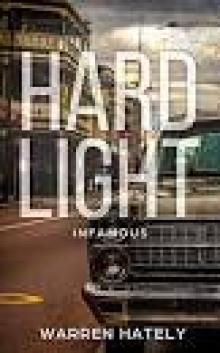 Hard Light- Infamous
Hard Light- Infamous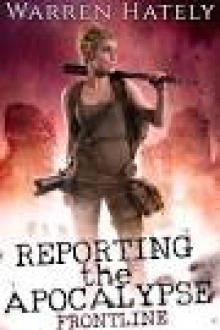 Frontline
Frontline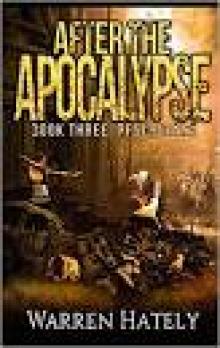 After the Apocalypse Book 3 Resurgence: a zombie apocalypse political action thriller
After the Apocalypse Book 3 Resurgence: a zombie apocalypse political action thriller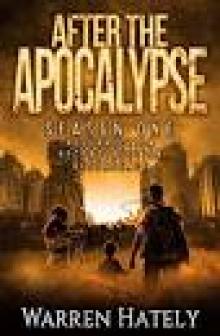 After The Apocalypse Season 1 Box Set
After The Apocalypse Season 1 Box Set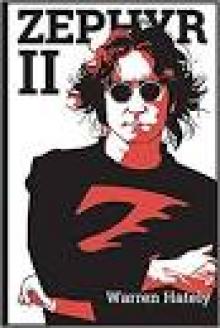 Zephyr Box Set 2
Zephyr Box Set 2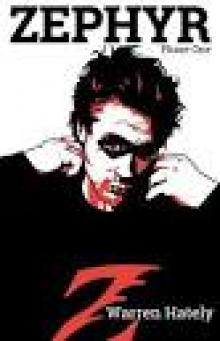 Zephyr Box Set 1
Zephyr Box Set 1 Endless Night
Endless Night After the Apocalypse Book 1 Resurrection: a zombie apocalypse political action thriller
After the Apocalypse Book 1 Resurrection: a zombie apocalypse political action thriller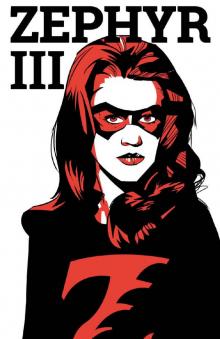 Zephyr III
Zephyr III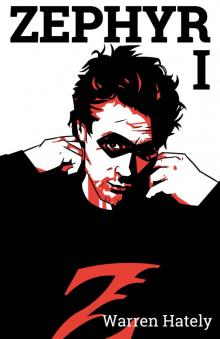 Zephyr I
Zephyr I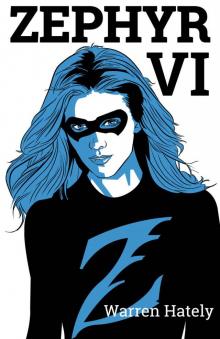 Zephyr VI
Zephyr VI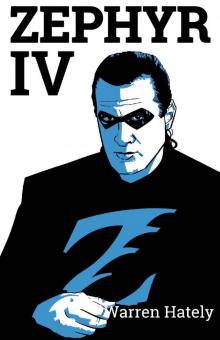 Zephyr IV
Zephyr IV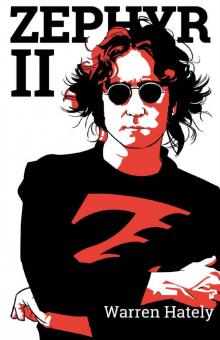 Zephyr II
Zephyr II